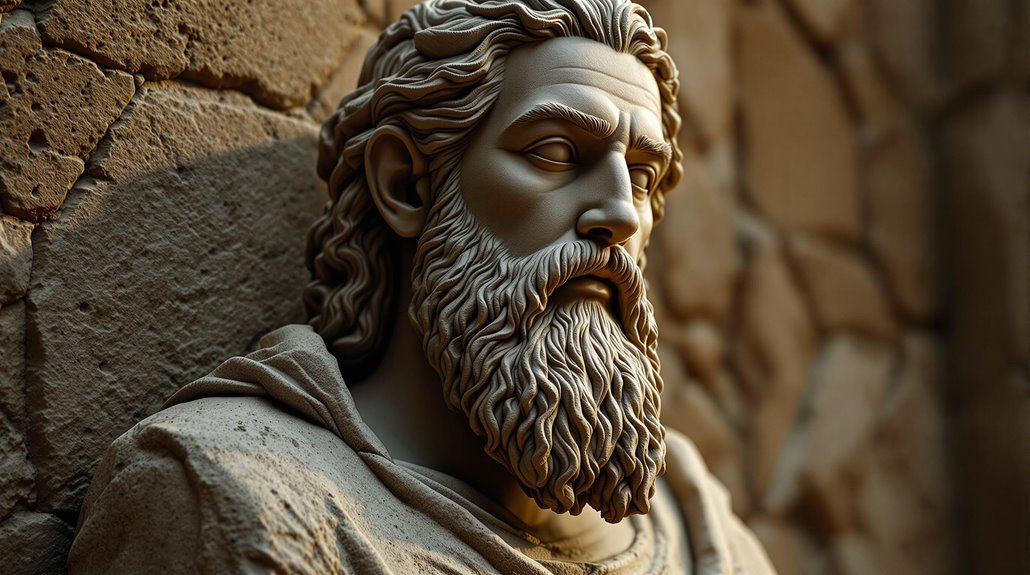What Do Beards Symbolize in the Bible?

In the Bible, beards symbolize wisdom, dignity, and spiritual maturity. They indicate leadership and divine authority, as seen with figures like David and Aaron. Having a beard was a sign of maturity and high social standing in ancient Israelite culture, representing obedience to divine commandments. Well-groomed beards were viewed as symbols of honor, strength, and virility. Shaving a beard was considered disgraceful, affecting a man's dignity and authority. Biblical teachings, like those in Leviticus 19:27, emphasize beards to differentiate Israelites from pagan practices. Investigate more about how these symbols have evolved over time.
Biblical Symbolism of Beards
Throughout biblical times, beards carried a profound symbolism, representing wisdom, dignity, and masculinity. When you explore the Old Scripture, you'll find that beards were more than just facial hair; they were markers of a man's maturity and social standing. Figures like David, Aaron, and Ezekiel are depicted with beards, reinforcing their roles as leaders with divine authority. For the Israelites, these leaders' beards symbolized strength and a connection to God.
The cultural significance of beards is further emphasized in Leviticus 19:27, where specific grooming practices were commanded. By maintaining their beards in a distinct manner, Israelites differentiated themselves from pagan cultures, underscoring their commitment to God. This practice was not merely about appearance but about embodying the values of their faith community.
Even the story of Samson illustrates how a man's uncut hair and beard could be linked to divine empowerment. His strength was tied to these symbols of masculinity, echoing the broader biblical theme of beards as a source of power. In the New Scripture, beards remained a cultural norm, with Jesus likely having one, reinforcing the enduring association with masculinity and devotion.
Religious Significance
When you investigate the religious significance of beards in the Bible, it becomes clear they're not just about aesthetics. Beards hold deep spiritual meaning, especially for Christian men. They're seen as a sign of manhood and spiritual maturity, reflecting a commitment to God's commands. Biblical evidence, such as Leviticus 19:27, underscores the importance of grooming laws within the Mosaic Law. This highlights how a beard could distinguish the devout from those following worldly practices.
Throughout church history, beards have been a symbol of piety and religious devotion. Clergy members, particularly in Orthodox traditions, often wear long beards as a visible sign of their faith. This physical appearance serves as a witness to their spiritual expedition and dedication. Even in New Testament references, Jesus is implied to have had a beard, aligning with the cultural norms of His time and reinforcing its religious significance.
Thus, in biblical narratives, the beard is more than just facial hair; it's a profound symbol of obedience and adherence to divine commandments. For Christian men, it reflects their social status, spiritual maturity, and commitment to living a life in accordance with God's will.
Cultural Context
During biblical times, beards weren't just a fashion statement; they were deeply woven into the cultural fabric of ancient Israelite society. A beard was a symbol of masculinity and maturity, representing a man's adherence to tradition and his social status. The cultural significance of beards was so strong that Leviticus 19:27 explicitly prohibited certain grooming practices, reinforcing the importance of maintaining a beard as a marker of piety and identity.
Historical figures like King David and Aaron are often depicted with beards, underscoring their authority and the dignity associated with their roles as leaders. Their beards were not only a sign of their personal wisdom but also a reflection of the respect they commanded within their communities. Within this framework, beards were more than just facial hair—they were emblems of strength and leadership.
The cultural significance of beards during biblical times also highlighted a stark contrast with the clean-shaven trends of the Greco-Roman period. While different societies had varying views on masculinity and appearance, the ancient Israelites saw beards as an integral part of their identity and cultural heritage.
Beards in Old Testament
Beards in the Old Scripture aren't just facial hair; they symbolize wisdom and maturity, vital elements of a man's identity. When you look at figures like David and Aaron, their beards reflect their status and experience. In the Old Canon, beards were significant, serving as markers of masculinity and cultural identity. They represented a man's wisdom and maturity, pivotal in a society that valued experience and authority.
Leviticus 19:27 highlights the importance of beards by prohibiting certain grooming practices, reinforcing their role in maintaining cultural and religious identity among the Israelites. Shaving a beard wasn't just a cosmetic choice; it was seen as a disgrace. For instance, when King Hanun humiliated David's messengers by shaving their beards, it wasn't only an attack on their dignity but also a challenge to David's authority, sparking conflict.
Moreover, beards were a sign of mourning and grief in biblical times, demonstrating a deep emotional response to loss. The presence of beards in these narratives underscores their significance as symbols of wisdom, maturity, and social status, fundamental to the cultural fabric of ancient Israelite society.
Beards in New Testament

In the New Scripture, while beards aren't explicitly mentioned, the cultural backdrop suggests Jesus and many of his contemporaries likely wore them, adhering to Jewish customs. This practice reflects the norms of the period, where beards symbolized masculinity and spiritual maturity. You might find it interesting that although the New Canon doesn't focus on outward appearances, the presence of beards was still common among men of faith, including early Christian leaders.
The prophetic reference in Isaiah 50:6 alludes to Jesus, indicating the significance of beards in contexts of suffering and humiliation. This suggests that, while the New Canon prioritizes inner character, beards had their place in cultural expressions of faith and endurance. Early Christian writings support this, portraying beards as a part of the broader cultural tapestry of the timeframe.
While you read the New Canon, you'll notice discussions around grooming practices emphasize moral and spiritual implications rather than strict rules about beards. Beards have grown to symbolize more than just facial hair; they resonate with the idea that God has created each individual with a unique purpose, highlighting the harmony between outer appearance and inner spiritual growth.
Modern Interpretations
As you move from the historical context of beards in biblical times to today, you'll notice a distinct shift in meaning and significance. In modern times, growing a beard often signifies a personal choice rather than adherence to traditional biblical symbolism. Many men view their facial hair as an expression of masculinity, a God-made attribute they choose to accept or reject based on individual preference. This shift is evident in numerous Protestant churches, where the emphasis on beards has evolved from spiritual significance to a reflection of personal beliefs and interpretations of scripture.
Social media plays a crucial role in shaping contemporary perceptions of beards. It promotes varied styles and encourages men to challenge traditional norms of masculinity and spirituality. Some Christians see beards as a sign of faith and piety, while others prioritize their own understanding of scripture, leading to a wide range of opinions within the church. This conversation often underscores the tension between cultural influences and biblical teachings, prompting individuals to reevaluate their convictions. Ultimately, the modern interpretation of beards invites a dialogue between personal choice and traditional beliefs, urging men to find a balance that resonates with their faith and identity.
Personal Grooming Practices

How did personal grooming practices in biblical times shape societal norms and religious beliefs? In those days, personal grooming wasn't just about appearance; it reflected deeper cultural and religious values. Beards played a significant role, with God's commands in Leviticus 19:27 setting guidelines for maintaining them. Certain beard styles linked to pagan practices were prohibited, aligning with religious and cultural norms. A well-groomed beard distinguished men, symbolizing honor, strength, and virility, while being clean-shaven could imply shame or a loss of status, as seen in 2 Samuel 10:3-5.
Trimming or shaving beards was sometimes acceptable, but only in specific contexts like illness or mourning. These exceptions highlight the importance of context in personal grooming. Key biblical figures like David and Aaron were often depicted with beards, marking their authority and roles within their communities. These grooming choices were not only influenced by God's commands but also by societal expectations, emphasizing the beard's role in expressions of faith and masculinity.
Across cultures, interpretations of beards varied, yet they consistently remained a symbol of identity and adherence to cultural norms, reinforcing the societal fabric of biblical times.




